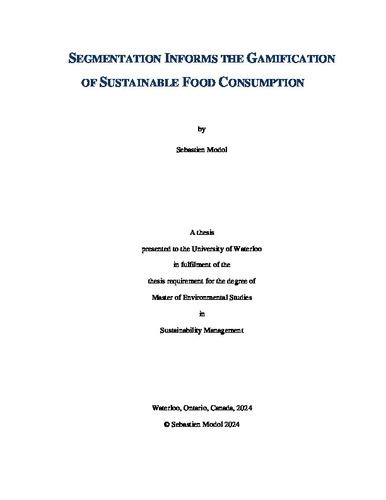| dc.contributor.author | Modol, Sebastien | |
| dc.date.accessioned | 2024-01-18 13:49:04 (GMT) | |
| dc.date.available | 2024-01-18 13:49:04 (GMT) | |
| dc.date.issued | 2024-01-18 | |
| dc.date.submitted | 2024-01-08 | |
| dc.identifier.uri | http://hdl.handle.net/10012/20245 | |
| dc.description.abstract | Food systems activities produce around 30% of global anthropogenic greenhouse gas (GHG) emissions and are responsible for numerous environmental issues which could ultimately harm our ability to grow food reliably. One way to reduce the food system’s impacts is to transition to a more sustainable diet composed of low impact foods. The objective of this study is to identify consumers demonstrating an intention to consume sustainably produced foods, and to identify their characteristics to inform the design of targeted gamified interventions that would promote sustainable food purchasing. A survey incorporating variables from the theory of planned behaviour (e.g. attitude), socio-demographic information (e.g. age), gamification profiling variables (e.g. player typology), as well as preferred mobile applications, was developed in this study and distributed via a market survey company. Statistical analysis in the form of hierarchical clustering was used to segment and identify target markets, while contingency analysis assessed the most effective means of promoting sustainable diets. A total of four hundred and ninety surveys were distributed and three hundred and seventy-six of them were validated because they agreed to participate, were not detected as potential AI powered responses, and their responses from the theory of planned behaviour were completed. Linear regression was used to assess the significance of all variables on the intent to consume a sustainable diet. Cluster analysis identified 3 potential target segments, and contingency analysis was used to detect their unique features. Two consumer segments were identified as having high potential as a target market. Individuals in this market intended to consume a sustainable diet but lacked follow through. Strong evidence towards the effectiveness of gamification of interventions was not observed due to low and medium frequency in gaming behaviours for the two target segments. Interventions distributed through mobile applications would be most effective if they were delivered through social media and included game design elements associated with Philanthropist and Free Spirit user types. The survey was confined to Ontario, therefore it may not be generalizable to other regions. Nevertheless, this study is unique in its assessment of the profiles of consumers with high intention to purchase sustainably sourced foods through a combination of the theory of planned behaviour, socio-demographic factors, gamification player types and game behaviours, as well as preferred mobile application usage. | en |
| dc.language.iso | en | en |
| dc.publisher | University of Waterloo | en |
| dc.subject | Sustainable | en |
| dc.subject | Food | en |
| dc.subject | Segmentation | en |
| dc.subject | Healthy | en |
| dc.subject | Diet | en |
| dc.subject | Gamification | en |
| dc.subject | Intervention | en |
| dc.subject | Behavior Change | en |
| dc.title | SEGMENTATION INFORMS THE GAMIFICATION OF SUSTAINABLE FOOD CONSUMPTION | en |
| dc.type | Master Thesis | en |
| dc.pending | false | |
| uws-etd.degree.department | School of Environment, Enterprise and Development | en |
| uws-etd.degree.discipline | Sustainability Management | en |
| uws-etd.degree.grantor | University of Waterloo | en |
| uws-etd.degree | Master of Environmental Studies | en |
| uws-etd.embargo.terms | 0 | en |
| uws.contributor.advisor | Dias, Goretty | |
| uws.contributor.affiliation1 | Faculty of Environment | en |
| uws.published.city | Waterloo | en |
| uws.published.country | Canada | en |
| uws.published.province | Ontario | en |
| uws.typeOfResource | Text | en |
| uws.peerReviewStatus | Unreviewed | en |
| uws.scholarLevel | Graduate | en |

